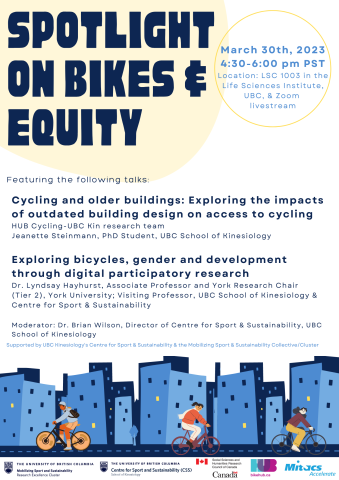
Spotlight on Bikes and Equity was a free, public event showcasing recent research on cycling and equity-related issues. It took place on March 30th, 2023 at UBC. The event was supported by UBC Kinesiology’s Centre for Sport and Sustainability and the Mobilizing Sport and Sustainability Collective/Cluster.
Click here to view a recording of the event!
The event featured the following talks:
'Cycling and older buildings: Exploring the impacts of outdated building design on access to cycling' - Jeanette Steinmann
Cycling for transportation has risen in popularity in many urban centres recently, yet, barriers to engaging in city cycling still exist. Many older buildings have insufficient cycling storage facilities and amenities that may prevent people from taking up cycling. To better understand these barriers, HUB Cycling and UBC Kinesiology researchers collaborated on a study focused on older buildings and cycling accessibility in Metro Vancouver. The project investigated the experiences of people who ride bicycles and live, or work, in older buildings in Metro Vancouver and the dynamics impacting the improvement of cycling facilities in older buildings. Lead researcher, Jeanette Steinmann, will present the study's findings and recommendations to best support the improvement of safe and accessible cycling infrastructure in buildings across the region.
'Exploring bicycles, gender and development through digital participatory research’ - Dr. Lyndsay Hayhurst
The bicycle’s capacity to respond to pressing social issues (e.g., gender inequality, access to education) and facilitate social change has inspired both interest and optimism, especially in the context of COVID-19. For example, in May 2020, the United Nations formed a taskforce to assess how to “make post-COVID-19 mobility more environmentally sound, healthy and sustainable” with an eye to “bicycles as driver[s] of post-COVID-19 ‘green recovery’” (UN, 2020). At the same time, there are a number of non-governmental organizations around the world that utilize bicycles to address social issues, including for instance: reducing gender-based violence; promoting social entrepreneurship for women and girls in bicycle-related work; and considering the roles of women and girls in achieving the aforementioned ‘green recovery’ in a (post-)COVID context. Dr. Lyndsay Hayhurst will share insights from a collaborative digital participatory research study on bicycles, gender and development across global contexts.
A Q&A followed the talks. The event was moderated by Dr. Brian Wilson, Director, UBC Kinesiology's Centre for Sport and Sustainability.
About the speakers
Dr. Lyndsay Hayhurst (she/her) is a Tier 2 York Research Chair in ‘Sport, Gender and Development and Digital Participatory Research’, Director of the ‘DREAMING Sport Lab’ (Digital participatory Research in Equity, Access, Mobility, Innovation aNd Gender in Sport Lab). She is an Associate Professor in the School of Kinesiology and Health Science at York University in Toronto, Canada and a Visiting Professor in the School of Kinesiology and The Cenre for Sport and Sustainability at UBC.
Her research interests include sport for development and peace (SDP); gender-based violence and sexual and reproductive health in/through SDP; digital participatory action research; trauma-and violence-informed approaches to SDP; cultural studies of girlhood; postcolonial feminist theory; global governance, international relations and corporate social responsibility; SDP in Indigenous communities; and the gender, sport and environment nexus.
She is a co-author (with Holly Thorpe and Megan Chawansky) of Sport, Gender and Development: Intersections, Innovations and Future Trajectories; and co-editor (with Tess Kay and Megan Chawansky) of Beyond Sport for Development and Peace: Transnational perspectives on theory, policy and practice. Her publications have appeared in Women’s Studies International Forum; Gender, Place & Culture; Third World Quarterly and Sociology of Sport Journal. She has previously worked for the United Nations Development Programme and Right to Play.
Jeanette Steinmann (she/they) is a PhD student in the UBC School of Kinesiology. She completed an MA at UBC (Kinesiology, 2020) which focused on the perspectives and experiences of unhoused people who ride bikes in Vancouver. Prior to that they completed a B.Kin at the University of Calgary (2017). Jeanette’s doctoral work explores topics at the intersection of poverty, physical activity, transportation, and housing. Her dissertation is focused on the experiences of marginalized bicycle riders and on bicycle storage and accessibility in older buildings and for people who are precariously housed. Jeanette’s publications have appeared in the journals Mobilities, the Sociology of Sport Journal and Qualitative Research in Sport, Exercise and Health, as well as in The Tyee and The Conversation. They are also the Research and Information Coordinator for The UBC Centre for Sport and Sustainability.
Related Links:
Bicycles for Development website
UBC Centre for Sport and Sustainability website
Wayfinding UBC - Life Sciences Centre